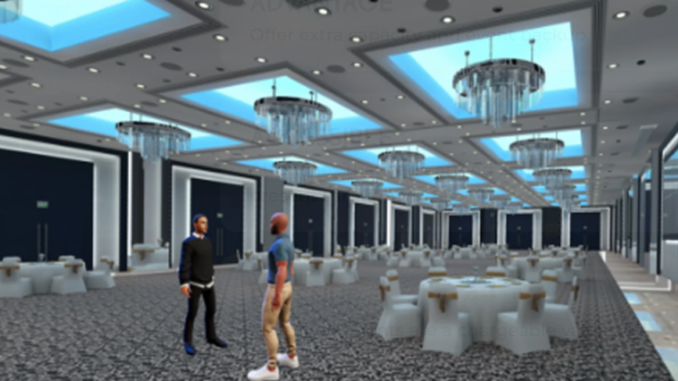
By Peter Gould, CEO of RendezVerse - 12.11.2022
Though it should need no introduction, let us begin by introducing the metaverse – an immersive world of virtual reality which originated in science fiction and is set to become the next iteration of the internet. Sounds exciting, right?
In 2022, investment into the metaverse space is already more than double what it was in 2021, proving we’re not the only ones keen to be on this journey. With the potential to generate up to $5 trillion in value by 2030, according to McKinsey and Co, the metaverse is an opportunity which demands attention across all industries, not least hospitality.
The hotels and events sector is worth $1.25 trillion, with 33% of all hotel revenue generated through events; this rises to 75% in sector-specific hotels, and it is here where the potential of the metaverse can level up hotel offerings.
Given the current inefficiencies of the industry, it’s a wonder the sector can be valued so highly when we consider the disconnected nature of the workflow, the outdated methods of doing business and its environmental impact on the planet. However, it is clear that hotel events, from planning and organizing to attending and networking, are overdue for an update before the system crashes.
For ambitious event planners, going the extra mile to find the perfect venue is par for the course of planning a successful event. With information at our fingertips, we’ve become accustomed to shopping around and this scoping out for a dream venue results in approximately 100 million site inspections each year.

Most of these visits sadly do not result in a booking, resulting in wasted time, resources, and lost revenue, not to mention the impact on the planet as planners take international flights across the world on their hunt for the ultimate venue. This outdated way of working needs to change.
Through the power of Web3 and true-to-life digital twins, hotels can dramatically reduce the number of unfruitful site visits, claw back lost revenue, and maximize profits on their event spaces.
By creating a digital twin of their event space, accessed through the metaverse, hotels can welcome prospective clients into the venue at the touch of a button. In addition, event planners can view their entire shortlist of venues in one afternoon from the comfort of their desks, saving time, money, and the planet.
The current alternative to in-person site visits is website imagery, maybe a virtual tour, or possibly even 360-degree photography. But this is not sufficient. Imagine greeting a prospective client at your venue and instructing them to wander around the space alone, undirected and with no one to answer any questions or give any information. You’d never do it. So why do it on your website?
Some businesses are turning to mobile devices and video conferencing tools to plug this gap, yet the workflow remains clunky and unfulfilling. Such platforms were not built for site inspections which is why hotels need a tool which is truly fit for purpose and can take site inspections to the next level.
Rather than wandering around a virtual space unaided, the metaverse allows hotel staff to meet with the prospect and walk them through the venue, just as they would in real life. The metaverse experience instils a feeling of authentic presence, which is why it cannot be beaten by any other digital alternatives which do not give this life-like level of immersion.
Not only can a metaverse site visit feel like the real thing, but it can even go as far as to better reality. In real life, planners must imagine different layouts, décor, lighting, and weather. In the metaverse, they can experience them and have them right before their eyes in seconds.
At last, hotels can demonstrate the versatility of their venues effortlessly and effectively, making closing that deal that little bit more likely.
The hotel industry has a lot to answer for when it comes to sustainability; from single-use plastics to industrial laundry loads, hospitality is not green by design. Nevertheless, it is on the mind of most businesses that our sustainability efforts must improve as eco-conscience begins to impact consumer choices.
By taking your site visits into the virtual world, hotels can eliminate tens of millions of flights, rail and car journeys and their associated impact on the planet. As the industry progresses to net zero, innovative changes like this will make all the difference in reducing our environmental impact without compromising product offerings or revenue goals.
It’s a business no-brainer. Not only do metaverse site visits reduce a hotel’s environmental output, but they also cut unnecessary costs. For example, for an in-person site visit, the venue must be heated or air-conditioned, lit and freshly cleaned, not forgetting that all the while, the space is unbookable and therefore unprofitable.
Conducting a metaverse site visit means that while you’re showcasing your virtual venue, your physical venue can thrive with real-life business, making a profit and adding to that $1.25 trillion industry.
Though initially used in the planning stages of an event, the metaverse also holds numerous possibilities for the attendance of events. Metaverse tickets unlock the option to attend events on every corner of the planet without even leaving the house, reducing cost and environmental impact while increasing opportunities.
Thanks to the metaverse, a virtual event no longer needs to feel like a poor relation to its in-person counterpart. In the future, virtual attendees will be able to interact with in-person attendees as they would in real life, ensuring that no one’s event experience is diluted.
Not only does this mean that hotels can kiss goodbye to capacity limits and generate extra ticket sales through virtual event passes, but it also means Web3 technology can be woven throughout the entire event. From smarter networking to crypto payments, these technologies will bring about slick innovations the hospitality sector craves.
Enlisting the power of the metaverse for hotels and events makes sense for the tech heads, the business brains, and the eco-conscious. Save time, money, and the planet, whilst levelling up your event offering from planning to attendance, with the metaverse.
 Peter Gould is CEO of RendezVerse, a platform that allows prospects to enter a hotel event space with virtual 360-degree tours or full CGI digital twins. Chairman of Worldwide Events, and founder and former CEO of Great Hotels of the World, Peter has always pioneered technology to make events and meetings more efficient. In 2010, he created Face2Face, a revolutionary scheduling software, for one-to-one meetings at events.
Peter Gould is CEO of RendezVerse, a platform that allows prospects to enter a hotel event space with virtual 360-degree tours or full CGI digital twins. Chairman of Worldwide Events, and founder and former CEO of Great Hotels of the World, Peter has always pioneered technology to make events and meetings more efficient. In 2010, he created Face2Face, a revolutionary scheduling software, for one-to-one meetings at events.
Are you an industry thought leader with a point of view on hotel technology that you would like to share with our readers? If so, we invite you to review our editorial guidelines and submit your article for publishing consideration.
